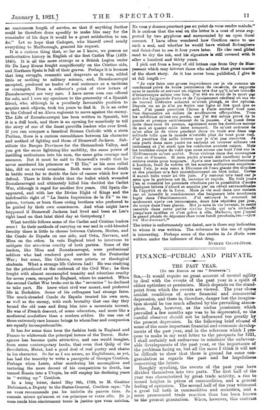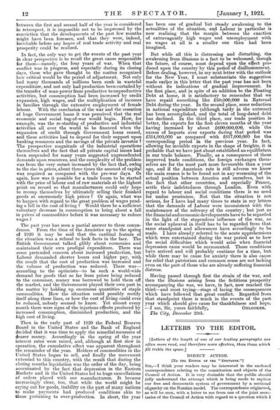(To THE EDITOR OF TEE " SPEOTATOIL")
Sin,—It would require no great amount of mental agility to deal with the events of the past year in a spirit of either optimism or pessimism. Much depends on the stand- point from which the events are viewed. The year closes amidst conditions of: acute financial and commercial depression, and there is, therefore, danger lest the imagina- tion should be too much affected by the prevailing atmos- phere. Just, however, as the undue pessimism which prevailed a few months ago was to be deprecated, so the careful observer should not be influenced too greatly by the present depression. In the following brief resume of some of the more important financial and economic develop. ments of the past year, and in the reference which I pro- -pose to make in my next letter to the prospects for 1921, I shall certainly not endeavour to minimize the unfavour- able developments of the past year, or the importance of the problems facing us, but all the same I think it will not be difficult to show that there is ground for some con- gratulation as regards the past and for hopefulness concerning the future. Roughly speaking, the events of the past year have divided themselves into two parts. The first half of the year was characterized by great trade activity, a rise to record heights in prices of commodities, and a general feeling of optimism. The second half of the year witnessed a great fall both in commodities and securities, and a more pronounced trade reaction. than has been known to the present generation. When, however, this contrast between the first and second half of the year is considered in retrospect, it is impossible not to be impressed by the conviction that the developments of the past few months might have been foreseen, and that they were, indeed, inevitable before any hopes of real trade activity and real prosperity could. be realized.
In fact, the only way to get the events of the past year in clear perspective is to recall the great cause responsible for them—namely, the four years of war. When that conflict was in progress, and especially during its closing days, those who gave thought to the matter recognized how critical would be the period of adjustment. Not only had many thousands of millions been sunk in wasteful expenditure, and not only had production been curtailed by the transfer of man-power from productive to unproductive activities, but consumption had been increased by credit expansion, high wages, and the multiplication of incomes in families through the extensive employment of female labour. With the conclusion of the war and the cessation of huge Government loans it was perceived that the real economic and social tug-of-war would begin. How, for example, was the re-starting of productive and industrial activities all over the world to be financed when the expansion of credit through Government loans ceased, and these activities had to depend for their support upon banking resources and the savings of the private investor The prospective magnitude of the industrial operations themselves and the fact that all private capital issues had been suspended for many years suggested unprecedented demands upon resources, and the complexity of the problem was from the very outset increased by the fact that, owing to the rise in prices, about three times the amount of capital was required as compared with the pre-war days. Or again, how was it possible for a trade boom to be started with the price of labour and of raw materials at the highest point on record so that manufacturers could only hope to recoup themselves by ultimately selling their finished goods at enormously high prices ? Or again, what was to happen with regard to the great problem of wages pend- ing a fall in the cost of living ? Would there be a sufficient voluntary decrease in consumption to bring about a fall in prices of commodities before it was necessary to reduce wages ?
The past year has seen a partial answer to these conun- drums. From the time of the Armistice up to the spring of 1920 it may be said that the cardinal feature of the situation was a refusal to look facts in the face. The British Government talked glibly about economies and maintained their own prodigal expenditure. There was some pretended concern about increased production, but Labour demanded shorter hours and higher pay, with the result that the cost of production was increased and the volume of production was reduced. There was— according to the optimists—to be such a world-wide demand for goods that so far from prices being reduced to the consumer, money was borrowed to hold them off the market, and the Government played their own part in the matter by holding up enormous quantities of staple commodities. How the situation could possibly rectify itself along these lines, or how the cost of living could ever be reduced, nobody seemed to know. Yet almost every month there were signs of the injurious effects produced by increased consumption, diminished production, and the high cost of living.
Then in the early part of 1920 the Federal Reserve Board in the United States and the Bank of England decided that it was time to apply the remedial measures of dearer money. Accordingly in the spring of the year interest rates were raised, and, although at first slow in operation, the cumulative effect was apparent throughout the remainder of the year. Holders of commodities in the United States began to sell, and finally the movement extended to this country, with the result that during the closing months liquidation was the order of the day, being accentuated by the fact that depression in the Eastern Markets and in the United States led to huge cancellations of orders placed with our manufacturers. It became increasingly clear, too, that while the world might be crying out for goods, inability on the part of many nations to make payments had produced conditions akin to those pertaining to over-production. In short, the year has been one of gradual but steady awakening to the actualities of the situation, and Labour in particular is now realizing that the margin between the exaction of extravagantly high wages and unemployment with no wages at all is a smaller one than had been imagined.
But while all this is distressing and disturbing, the awakening from illusions is a fact to be welcomed, though the future, of course, must depend upon the effect pro- duced upon the country by this period of disillusionment. Before dealing, however, in my next letter with the outlook for the New Year, I must substantiate the suggestion made earlier in this letter that the past year has not been without its indications of gradual improvement. In the first place, and in spite of an addition to the Floating Debt at home, it is satisfactory to remember that we have repaid something like £80,000,000 in External Debt during the year. In the second place, some reduction in national expenditure (although tardy in the extreme) has been accomplished, and the total of long-dated debt has declined. In the third place, our trade position is better, the exports for the first eleven months of the year having increased by about £600,000,000, while the excess of imports over exports during that period was £314,000,000 as compared with £617,000,000 for the corresponding period in the previous year. In fact, allowing for invisible exports in the shape of freights, it is probable that we have lust about established an equilibrium in our trade balance. Finally, as a consequence of these improvedtrade conditions, the foreign exchanges them- selves are for the most part more favourable than a year ago, and if the American rate is still adverse we know the main reason is to be found not in any worsening of the actual position between America and ourselves, but in the fact that other countries, and especially France, settle their indebtedness through London. Even with regard to labour and social conditions there is no need for undue pessimism. Not that the situation is not serious, for I have had many times to state in my letters that the demands of Labour were inconsistent with the maintenance of the solvency of the country; but just as the financial andeconomic developments have to be regarded in the light of the stupendous influence of the war, so the social upheaval in itself has to be regarded from that same standpoint and allowances have accordingly to be made. I have already referred to the acute apprehensions which were entertained during the war period as to how the social difficulties which would arise when financial depression came would be surmounted. Those conditions have arrived and will probably continue for a time, but while there may be cause for anxiety there is also cause for relief that patriotism and common sense are not lacking even on the part of those who are already suffering financial distress.
Having passed through first the strain of the war, and then the illusions arising from the fictitious prosperity accompanying the war, we have, in fact, now reached the third—and most trying—stage of facing the consequences which have followed that great conflict. Regarded from that standpoint there is Much in the events of the past year which should give cause for thankfulness and hope.
—I am, Sir, yours faithfully, ONLOOKER.
The City, December 29th.











































 Previous page
Previous page